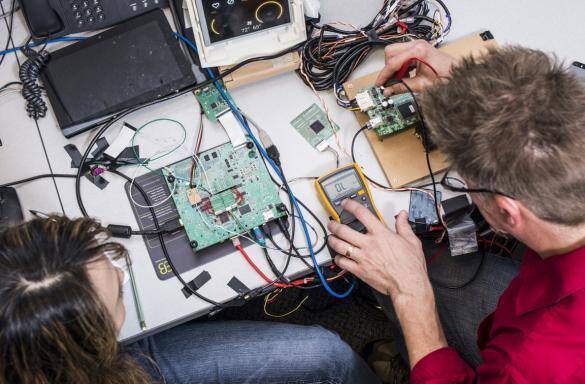
Infotainment
Industry leading systems built on any platform take personal data and voice activation to the next level.
Your next generation in-vehicle experience
As the lines between controlling a vehicle and experiencing it become blurred especially as the promise of autonomous driving becomes a reality, our IVI solutions are shaping the future transportation experience.Cognitive infotainment
Panasonic Cognitive Infotainment acts as a second brain to sync the thoughts and actions of drivers in unimaginable ways. With intuitive software and apps, drivers are assisted with contextual predictions, deployment flexibility, and attention management.
Android IVI – Adaptable for any OEM, Panasonic Automotive creates a seamlessly connected Android experience that is upgradable and adaptable to include new functionality, with a UI design that is faster, more adaptive, and supports a rich app ecosystem.
Automotive Grade Linux Collaboration Project (AGL) – As a proud member of the Automotive Grade Linux Collaborative Project, Panasonic Automotive supports the development of open source software solutions for vehicle applications to help deliver a fully open software stack for the connected car.
QNX IVI – As the basis of award-winning products, including Ford SYNC 3, Toyota EnTune, Chrysler UConnect, and Mercedes MIB, the QNX operating system combined with the Texas Instrument family of SoCs enables drivers with the latest tech, such as Android Auto and Apple CarPlay.

Evolved display designs with increased visual clarity
The way in which drivers and passengers interact with vehicles is rapidly changing. Larger and more capable displays provide information efficiently, while advances in human-machine-interface (HMI) systems are changing how occupants interact within the vehicle’s cockpit. As the lines of controlling and experiencing a vehicle blur through autonomous driving – especially as the promise of autonomous driving enables more time to work and play becomes a reality – Panasonic Automotive infotainment technologies are shaping the future transportation environment through larger, more capable displays and advances in HMI systems.
Interior automotive displays are evolving. Not only are the number of screens and interactive surfaces within a vehicle increasing, more manufacturers are ditching physical controls for capacitive, digital controls. Panasonic Automotive is focused on larger displays and more customizable data. An In-Plane Switching (IPS) leader, the company provides more design freedom, curved-glass, visual clarity, and high-end trim options.

Head-Up Displays (HUD)
Panasonic leverages decades of consumer electronics and optical expertise into our products. Head-up display (HUD) systems present data to drivers while keeping their attention on the road. Quickly becoming the main display in vehicles, Panasonic Automotive offers in-house-designed, cost-effective HUD technologies for specific OEM needs.
The HUD team utilizes in-house technology know-how to realize compact HUD packages that generate the highest quality image possible depending on vehicle preference. Established in 2015, Panasonic Automotive's HUD Optics Lab, located in Farmington Hills, Michigan, allows the team to precisely characterize HUD designs and images, along with windshield measurements, before conducting in-vehicle evaluation. Product development areas include:
Adjustable Distance AR
- Reduces eye fatigue & improves driver visibility
- Decreases the need for older drivers to shift focus frequently
Combiner HUD
- Optimized design using ultra precise “Free Form” optics
- State-of-the-art electric combiner storage mechanism
Ultra-Small Windshield HUD
- Small package is easy to install on a variety of vehicle types
- Thinner packaging with Ultra-thin PGU (Picture Generation Unit)
- Better visibility with low distortion and high brightness
Integrated Center Stack (ICS)
More manufacturers are utilizing integrated center stacks to enhance customer interaction and control of their vehicle. As an infotainment leader, Panasonic Automotive offers increased touch functionality, vertical integration, and patented capacitive rotary control knobs. At the forefront of curved center stack displays, new experiences are enabled, with improved usability and cost efficiencies.
Adaptable for specific and challenging vehicle interiors
Smart materials can assume any shape, even those impossible to manufacture with original materials. Materials can adapt to serve multiple functions and be manipulated to illuminate, animate, and display trip information, such as cabin temperature or estimated time. Our Smart Design Cockpit featured at CES 2018 demonstrated use of such materials, as shown below.